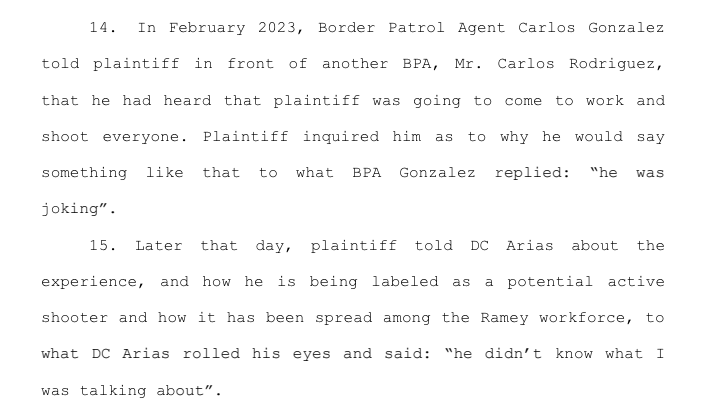CBP Agent was Intimidated by Superior Officers, Labeled a "Potential Active Shooter" by Colleagues, Federal Lawsuit Alleges
A CBP Agent alleges he was intimidated by superior officers, labeled a “potential active shooter” by colleagues and given a “dees nutz” shirt after filling an equal employment opportunity complaint.

A federal complaint filed in January by Gilberto Velez, a CBP officer at Ramey Station in Aguadilla with “more than 20 years of federal government service” alleges that he was intimidated by superior officers, labeled a "potential active shooter" by colleagues, and received a “dees nutz” shirt after filing an equal employment complaint.
Velez filed an Equal Employment Opportunity (EEO) complaint in August 2020. Since then, the document alleges, he has been passed up for multiple opportunities for promotion as well as suffered “reprisals” from superiors and colleagues that began less than six months after the EEO complaint was filed.
In July 2021, a hostile work environment allegation was filed against Velez, although it was later deemed unfounded, according to the lawsuit. Roberto Arias, the division chief at the time, allegedly later gave him an “official notification labeling him as having anger issues,” according to the lawsuit.
Later, in January 2022, Velez was giving suggestions about what to do about a group of detained non-migrants and was shot down by Wilmar Rodriguez, acting division chief at the time. When Velez later asked Rodriguez why his suggestion was denied, the following interaction allegedly took place:
“Mr. Rodriguez started to ask him [Velez]: ‘¿Do you know who are you [sic] talking to? while looking at his rank insignia. Then while inside the conference room, and plaintiff was already seated, Mr. Rodriguez stood in front of plaintiff in and intimidated [sic] manner licking his teeth and grabbing his gun. Plaintiff did not have his gun belt on or any other weapon with him at that time. Then Mr. Rodriguez said; "this meeting is over,’” alleges the federal complaint.

Nearly a year later, in February 2023 – the lawsuit alleges – a border patrol agent told Velez that “he had heard that plaintiff [Velez] was going to come to work and shoot everyone.” When he went to complain to Arias, Velez's worry that he was “being labeled as a potential active shooter” and that the rumor had spread among the Ramey workforce was dismissed, according to the lawsuit. DC Arias allegedly rolled his eyes and said: "he didn’t know what I [Velez] was talking about.”
Both of these alleged interactions would be red flags at any workplace, but especially one where most employees are armed. The “reprisals” led to a “hostile work environment” for Velez, according to the lawsuit.
The federal complaint does not explain why Velez filed the EEO complaint. But, according to the lawsuit, he withdrew it in November 2021 after his son was “enrolled in the Ramey School and that was his only concern.” The Department of Defense Education Activity Ramey Unit School serves dependents of active military and civilian federal employees serving at federal agencies that work out of what once was the Ramey Air Force Base, according to the school’s Facebook page.
A month after Velez withdrew the complaint, Division Chief Michael Estrada "gifted to plaintiff [Velez] a t-shirt with the word 'dees nutz.'" Velez, who understood he was referring to the EEOC dismissal, explained to Estrada the phrase's offensive origin and said it was an “unprofessional move,” alleges the lawsuit. If you’ve moved on from 2015 and don’t remember “dees nutz”, it was a popular meme that involved asking a vague question then screeching the phrase obnoxiously as a response.
Jose Arce Diaz, Velez’s lawyer, said his client did not want to speak to the press at this time. (Sadly, we will not be seeing the “dees nutz” shirt today.)
Both Arias and Estrada are listed as co-defendants in the "parties" section of the federal complaint, but are not in the epigraph.
Velez was allegedly found guilty of misconduct by the Office of Professional Responsibility in February 2023 after Rodriguez filed a complaint against him. Rodriguez, the lawsuit alleges, wrote in an official memorandum that Velez had used offensive language and “acted in an intimidating manner” towards him in January 2022. The lawsuit alleges that Velez was terminated from his detail as Patrol Agent in Charge - Intelligence because of the allegation.
However — the lawsuit claims — security camera video disproves the allegations of misconduct against Velez.
“A manager may not fire, demote, harass or otherwise ‘retaliate’ against an individual for filing a complaint of discrimination, participating in a discrimination proceeding, or otherwise opposing discrimination,” reads the EEOC page on retaliation.
Jeffrey Quiñones, CBP Regional Press Officer for Puerto Rico, the Virgin Islands, and the Caribbean, said “it is CBP's policy not to comment outside of the appropriate forum which is the Federal Court. We defer to the answer to the complaint as issued,” in a written statement.
“We do not comment on pending litigation,” said Justin Long, Deputy Director of CBP Media Relations, reached through DHS’s media inquiry email.
DHS’s response to the lawsuit has not been filed yet, according to the case’s docket on the Public Access to Court Electronic Records (PACER) website. The last document uploaded is a confirmation that a summons was issued on May 20.
While the aforementioned interactions are only allegations, CBP has a history of abuse towards migrants, U.S. citizens and their own agents. Jenn Budd, a former Senior Border Patrol agent and author of “Against the Wall: My Journey from Border Patrol Agent to Immigrant Rights Activist,” has seen a lot of it firsthand.
“Most of us do go in there naively thinking we’re defending our country. We want to be heroes and we want to save lives and all this other stuff. Then, after a certain point, you realize it’s bullshit,” she told me over the phone.
There have been many reported abuses by Border Patrol agents against migrants and U.S. citizens over the decades, but here are a few: Emails and text messages uncovered by the Huffington Post show that Border Patrol agents freely used the derogatory slur “tonk” to describe undocumented migrants, even at times joking about killing them. Agents with the Border Patrol Tactical Unit (BORTAC), snatched civilians into unmarked vans during the 2020 George Floyd protests in Portland, Oregon. An 8-year-old Honduran girl died while in Border Patrol custody last year. Her parents said she could have been saved had CBP done enough to help her and an anonymous “top CBP official” agreed with them, according to CBS News.
Inside of the federal agency, it’s “the worst frat house you can imagine,” Budd explained. She worked for CBP for six years and now is one of the agency’s harshest critics, constantly calling out and documenting the harm the agency inflicts.
Budd says she was raped by another agent while in the academy and was told by superiors to file an EEO complaint. However, she didn’t end up doing that because she was told women who filed EEO complaints failed out of the academy. These types of complaints often make the people who file them targets for harassment, Budd explained.
While CBP is only generally authorized to operate within 100 miles of land and coastal borders, the agency has seen its mandate extend inwards from U.S. borders as its budget has expanded. Puerto Rico, a small archipelago, is completely engulfed by this 100 mile limit, which the American Civil Liberties Union (ACLU) calls a “Constitution-free Zone.” Two-thirds of all Americans — about 200 million people — live within this designated area, according to the ACLU.
This operating remit allows CBP agents to stop you at a checkpoint (sometimes nowhere close to a U.S. border) and ask you if you are a U.S. citizen. Even though you are not required to respond, that will likely mean being detained for longer, which can lead into heated discussions and even being arrested and held for weeks while authorities check your migration status.
Budd — who tracks incidents of abuse by CBP — explains that Puerto Rico is “like a black hole” when it comes to information about Border Patrol abuses. From her understanding, the archipelago’s Border Patrol is a “very tight clique.” She adds that many Border Patrol agents along the Mexico-U.S. border don’t see Puerto Ricans as U.S. citizens. (We both laughed about that. Having to explain that Puerto Rico is a part of the U.S. is an experience that I and many Puerto Ricans are intimately familiar with.)
“They [Puerto Rican CBP agents] are not trusted in the same way that other agents are,” she said. Budd claimed she saw a Puerto Rican trainee fail an exam because they used their native dialect instead of the Mexican dialect more commonly used by the agency.
Ramey Sector in Puerto Rico is the only CBP sector outside of the continental United States.

In October 2017, Border Patrol sent out an email to five sectors soliciting interest from agents to deploy to Ramey Sector in Puerto Rico to conduct law enforcement operations and help humanitarian efforts after Hurricane Maria, a strong class 4 storm that ripped through the archipelago a month earlier. The message stated the Agency “request[ed] that volunteer agents DO NOT have family ties to Puerto Rico” (emphasis in original), according to an EEOC Office of Federal Operations (OFO) appeal document from 2022.
However, a CBP agent from New Mexico who did have family ties to the archipelago applied for the volunteer position anyway because “he did not think it would affect his ability to complete the Agency’s mission in Puerto Rico,” according to the OFO document. He was rejected. The agent later filed an individual and class complaint alleging the agency discriminated against him. An Administrative Judge (AJ) eventually found at least 46 CBP agents were rejected, discouraged from applying or otherwise directly affected by this agency policy, according to the OFO document. The AJ’s analysis concluded that the number of affected agents could be “much higher.”
It is currently unclear if the action has continued. The website for the class action complaint was last updated in February 2022 saying that the class for the complaint is now those who were excluded or denied the opportunity to serve in Ramey Sector after Hurricane Maria based on race/national origin (Hispanic/Puerto Rican) or association with other of Hispanic/Puerto Rican descent.
Heavy Weather filed a FOIA request with the EEOC and CBP to see the initial EEO complaint filed by Velez in August 2020, as well as any documentation of the alleged retaliation Velez received. The records request to the EEOC was denied because it didn’t have “any reference to the public’s interest” other than a right to know. We're filing a new one and will update this story if/when we hear back.
If you want to look at the court case, it can be found below. We have also uploaded the case to Courtlistener.

